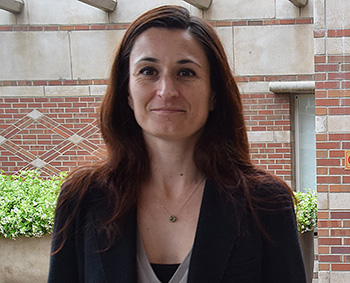
Emilie Garrigou-Kempton
Once Emilie Garrigou-Kempton joined the team of USC Shoah Foundation Center for Advanced Genocide Research last month as academic relations and outreach officer, she began to realize the connections she already has to the Institute.
Professor Armand Abecassis, who was recently interviewed for the Institute’s Testimonies from North Africa and the Middle East Collection, was her advisor in graduate school. And her husband’s distant relative, a Holocaust survivor, gave her testimony to USC Shoah Foundation years ago.
“I got to listen to [Armand Abecassis]’s testimony, which is very long, but it felt like being in the classroom with him again,” Garrigou-Kempton said. “And no one had actually seen [my husband’s relative’s] testimony, I was the first one to actually see it. It was very interesting. I was very impressed by her and I want to show it to her relatives.”
Garrigou-Kempton, who was born and raised in France, has master’s degrees in philosophy from Bordeaux University and international development from Lyons University. She obtained her PhD in French literature and gender studies from USC and recently worked at the International Federation of the Red Cross and Red Crescent Societies in Geneva, Switzerland.
At the Center, Garrigou-Kempton is building relationships with scholars, academic institutions and community members to broaden the community that is engaged with the Center’s activities and research. She’s currently helping to plan the Center’s 2016 international conference “A Conflict? Genocide and Resistance in Guatemala,” and thinking about ways to develop tools to help researchers learn how to use the Visual History Archive.
“USC Shoah Foundation has always felt like a place that would be important to work at."
Last week, Garrigou-Kempton was excited to meet with staff from American University in Paris, which is positioning itself as a hub of activity for the Visual History Archive in Paris, to begin developing a partnership between AUP and the Center for Advanced Genocide Research.
Her colleagues in USC Shoah Foundation’s Center for Advanced Genocide Research department are very collaborative and open to new ideas and suggestions, she said. Her goal is to continue increasing awareness for the Center and its work.
“I want to increase our visibility, get more people engaged in our lecture series, and get more researchers from more disciplines to show all the things that could be done [with testimony],” she said.
Her job at USC Shoah Foundation Center for Advanced Genocide Research combines her scholarly background and enthusiasm for hands-on projects, Garrigou-Kempton said. And with her personal connections to the Visual History Archive, it seems like it was meant to be.
“USC Shoah Foundation has always felt like a place that would be important to work at,” she said.